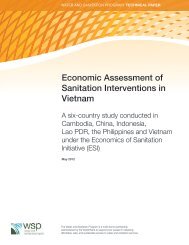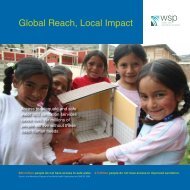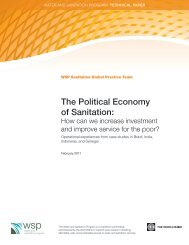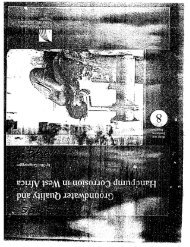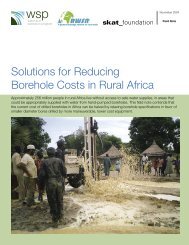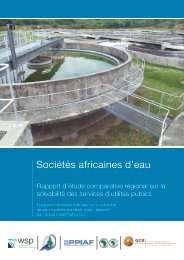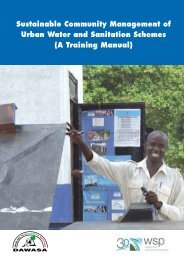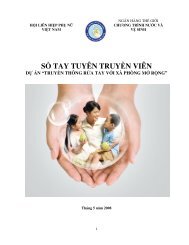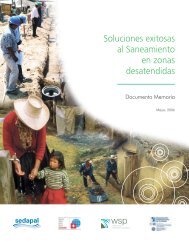Sustainability Planning and Monitoring
Sustainability Planning and Monitoring
Sustainability Planning and Monitoring
- No tags were found...
Create successful ePaper yourself
Turn your PDF publications into a flip-book with our unique Google optimized e-Paper software.
A NEW TOOL FOR PLANNERS AND MANAGERS OF LARGE CDD PROGRAMS2.3.2 Combining sustainabilityassessment with gender <strong>and</strong>social equity analysisthus of great relevance for projects, communities,families <strong>and</strong> individual women <strong>and</strong> men, girls<strong>and</strong> boys.Studies have shown that gender <strong>and</strong> social equityapproaches optimize results <strong>and</strong> impacts of watersupply <strong>and</strong> sanitation improvements. Suchapproaches may also improve the relativepositions of women <strong>and</strong> poor people (Fong etal., 1996, van Wijk, 1998, Woroniuk, 1994). Theoutcomes of the global study summarized abovesupport these conclusions with quantitativeevidence. A gender <strong>and</strong> social equity analysis isHowever, gender <strong>and</strong> social equity are two of themany issues that managers of water <strong>and</strong> sanitationprograms have to address. Particularly in largeinfrastructure projects, managers must realize awide span <strong>and</strong> variety of objectives within limitedtime frames, with fixed resources <strong>and</strong> regularfunding flows. The objectives may range fromachieving efficiency, effectiveness, sustainability,people’s participation, decentralization <strong>and</strong>Box 7 Social equity analysis in the MPALevel Issue Indicators Tools/Techniques(see Chapter 6)Community (Micro) levelAgency (Meso)levelPolicy (Macro)levelAccess for The number <strong>and</strong> distribution of facilities over Social map, transact walk,disadvantaged the settlement by social class; characteristics of focus group discussion, opencommunity groups unserved areas; characteristics of non-users; interview, welfarereasons for non-use.classification.Equity <strong>and</strong> Contributions to investments in kind <strong>and</strong>/or cash Card sorting, interviews withdem<strong>and</strong> from better- <strong>and</strong> less well-off; type of tariffs; members of water commitpaymentadjustments for the poor; payment tees, review of paymenthistory.records, welfare classification.Meeting dem<strong>and</strong>s Satisfaction of dem<strong>and</strong>s in relation to perceived Focus group meeting, cardcosts of contributions according to the poor <strong>and</strong> sorting <strong>and</strong> ranking, welfarethe non-poor.classification <strong>and</strong> ladders.Decision making Representation of the poor in management Social map, interviews with<strong>and</strong> control organizations; participation of the poor in water committees, matrixplanning decisions; representation of the poor voting with focus groups,in training <strong>and</strong> paid jobs, as compared to the welfare classification.non-poor.Institutional policy, Presence of objectives of access <strong>and</strong> affordability Open discussion, card sortingstrategies, <strong>and</strong> staff for all in agency water policies; agency strategy <strong>and</strong> various voting techniquescharacteristics regarding participation of the poor; staff <strong>and</strong> tools during stakeholdersexpertise <strong>and</strong> training includes poverty aspects meetings.which are practiced in the field; management isaware of <strong>and</strong> supports poverty sensitiveapproaches.Sector policy Presence of objectives of access <strong>and</strong> affordability Analysis of policy documents,for all in water sector policy; differential pricing semi-structured interviews withpolicy which protects the poor; gender policy card selection <strong>and</strong> scalealso aims at closing gap between rich <strong>and</strong> poor scoring or participatory policy(women <strong>and</strong> men).analysis workshop.13




